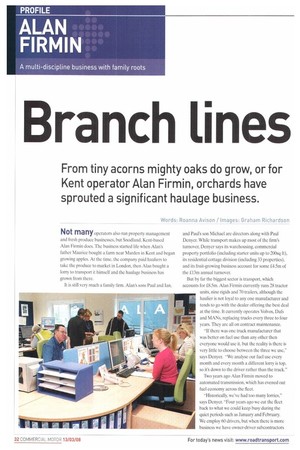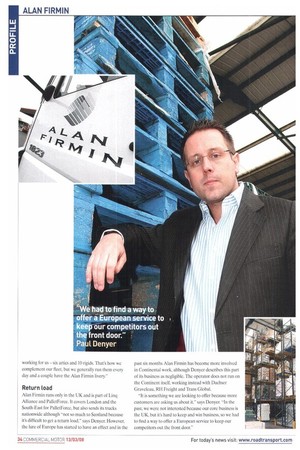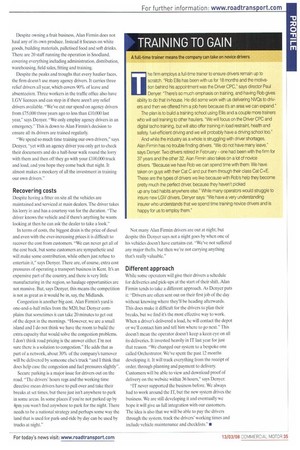Branch tines
Page 32

Page 34

Page 35

If you've noticed an error in this article please click here to report it so we can fix it.
From tiny acorns mighty oaks do grow, or for Kent operator Alan Firmin, orchards have sprouted a significant haulage business.
Words: Roanna Avison / Images: Graham Richardson
Not many operators also run property management
and fresh produce businesses, but Snodland, Kent-based Alan Firmin does. The business started life when Alan's father Maurice bought a farm near Marden in Kent and began growing apples. At the time, the company paid hauliers to take the produce to market in London, then Alan bought a lorry to transport it himself and the haulage business has grown from there.
It is still very much a family firm. Alan's sons Paul and Ian, and Paul's son Michael are directors along with Paul Denyer. While transport makes up most of the firm's turnover, Denyer says its warehousing, commercial property portfolio (including starter units up to 200sq ft), its residential cottage division (including 33 properties), and its fruit-growing business account for some £4.5m of the £13m annual turnover.
But by far the biggest sector is transport, which accounts for £8.5m. Alan Firmin currently runs 28 tractor units, nine rigids and 70 trailers, although the haulier is not loyal to any one manufacturer and tends to go with the dealer offering the best deal at the time. It currently operates Volvos, Dafs and MANs, replacing trucks every three to four years. They arc all on contract maintenance.
"If there was one truck manufacturer that was better on fuel use than any other then everyone would use it, but the reality is there is very little to choose between the three we use," says Denyer. "We analyse our fuel use every month and every month a different lorry is top, so it's down to the driver rather than the truck.
Two years ago Alan Firmin moved to automated transmission, which has evened out fuel economy across the fleet.
"Historically, we've had too many lorries," says Denyer. -Four years ago we cut the fleet back to what we could keep busy during the quiet periods such as January and February. We employ 60 drivers, but when there is more business we have owner-driver subcontractors working for us — six artics and 10 rigids. That's how we complement our fleet, but we generally run them every day and a couple have the Alan Firmin livery."
Return load Alan Firmin runs only in the UK and is part of Ling Alliance and PalletForce. It covers London and the South-East for PalletForce, but also sends its trucks nationwide although "not so much to Scotland because it's difficult to get a return load," says Denyer. However, the lure of Europe has started to have an effect and in the past six months Alan Firmin has become more involved in Continental work, although Denyer describes this part of its business as negligible. The operator does not run on the Continent itself, working instead with Dachser Graveleau, RH Freight and Trans Global.
"It is something we are looking to offer because more customers are asking us about it," says Denyer. "In the past, we were not interested because our core business is the UK, but it's hard to keep and win business, so we had to find a way to offer a European service to keep our competitors out the front door." Despite owning a fruit business, Alan Firmin does not haul any of its own produce. Instead it focuses on white goods, building materials, palletised food and soft drinks. There are 20 staff running the operation in Snodland, covering everything including administration, distribution, warehousing. field sales, fitting and training.
Despite the peaks and troughs that every haulier faces, the firm doesn't use many agency drivers. It carries three relief drivers all year, which covers 90% of leave and absenteeism. Three workers in the traffic office also have LGV licences and can step in if there aren't any relief drivers available. "We've cut our spend on agency drivers from 05,000 three years ago to less than £10,000 last year," says Denyer. "We only employ agency drivers in an emergency." This is down to Alan Firmin's decision to ensure all its drivers are trained regularly.
"We spend so much time training our own drivers," says Denyer, "yet with an agency driver you only get to check their documents and do a half-hour walk round the lorry with them and then off they go with your £100,000 truck and load, and you hope they come back that night. It almost makes a mockery of all the investment in training our own drivers,"
Recovering costs
Despite having a fitter on site all the vehicles are maintained and serviced at main dealers. The driver takes his lorry in and has a courtesy van for the duration. "The driver knows the vehicle and if there's anything he wants looking at then he can ask the dealer to take a look."
In terms of costs, the biggest drain is the price of diesel and even with the ever-increasing prices it is difficult to recover the cost from customers. "We can never get all of the cost back, but some customers are sympathetic and will make some contribution, while others just refuse to entertain it," says Denyer. There are, of course, extra cost pressures of operating a transport business in Kent. It's an expensive part of the country, and there is very little manufacturing in the region, so haulage opportunities are not massive. But, says Denyer, this means the competition is not as great as it would be in, say, the Midland& Congestion is another big cost. Alan Firmin's yard is one-and-a-half miles from the M20, but Denyer cornplains that sometimes it can take 20 minutes to get out of the depot in the mornings. "However, we are a small island and I do not think we have the room to build the extra capacity that would solve the congestion problems. I don't think road pricing is the answer either. I'm not sure there is a solution to congestion." He adds that as part of a network, about 30% of the company's turnover will be delivered by someone else's truck "and I think that does help ease the congestion and fuel pressures slightly".
Secure parking is a major issue for drivers out on the road. "The drivers' hours regs and the working time directive mean drivers have to pull over and take their breaks at set times, but there just isn't anywhere to park in some areas. In some places if you're not parked up by 4pm you won't find anywhere to park for the night. There needs to be a national strategy and perhaps some way the land that is used for park-and-ride by day can be used by trucks at night." Not many Alan Firmin drivers are out at night, but despite this Denyer says not a night goes by when one of his vehicles doesn't have curtains cut. "We've not suffered any major thefts, but then we're not carrying anything that's really valuable."
Different approach
While some operators will give their drivers a schedule for deliveries and pick-ups at the start of their shift, Alan Firmin tends to take a different approach. As Denyer puts it: "Drivers are often sent out on their first job of the day without knowing where they'll be heading afterwards. This does make it difficult for the drivers to plan their breaks, but we find it's the most effective way to work. When a driver's delivered a load, he will contact the depot or we'll contact him and tell him where to go next." This doesn't mean the operator doesn't keep a keen eye on all its deliveries. It invested heavily in IT last year for just that reason. "We changed our system to a bespoke one called Orchestrator. We've spent the past 12 months developing it. It will track everything from the receipt of order, through planning and payment to delivery. Customers will be able to view and download proof of delivery on the website within 36 hours," says Denyer.
"IT never supported the business before. We always had to work around the IT, but the new system drives the business. We are still developing it and eventually we hope it will give us full integration with our customers. The idea is also that we will be able to pay the drivers through the system, track the drivers' working times and include vehicle maintenance and checklists." •








































































































































































